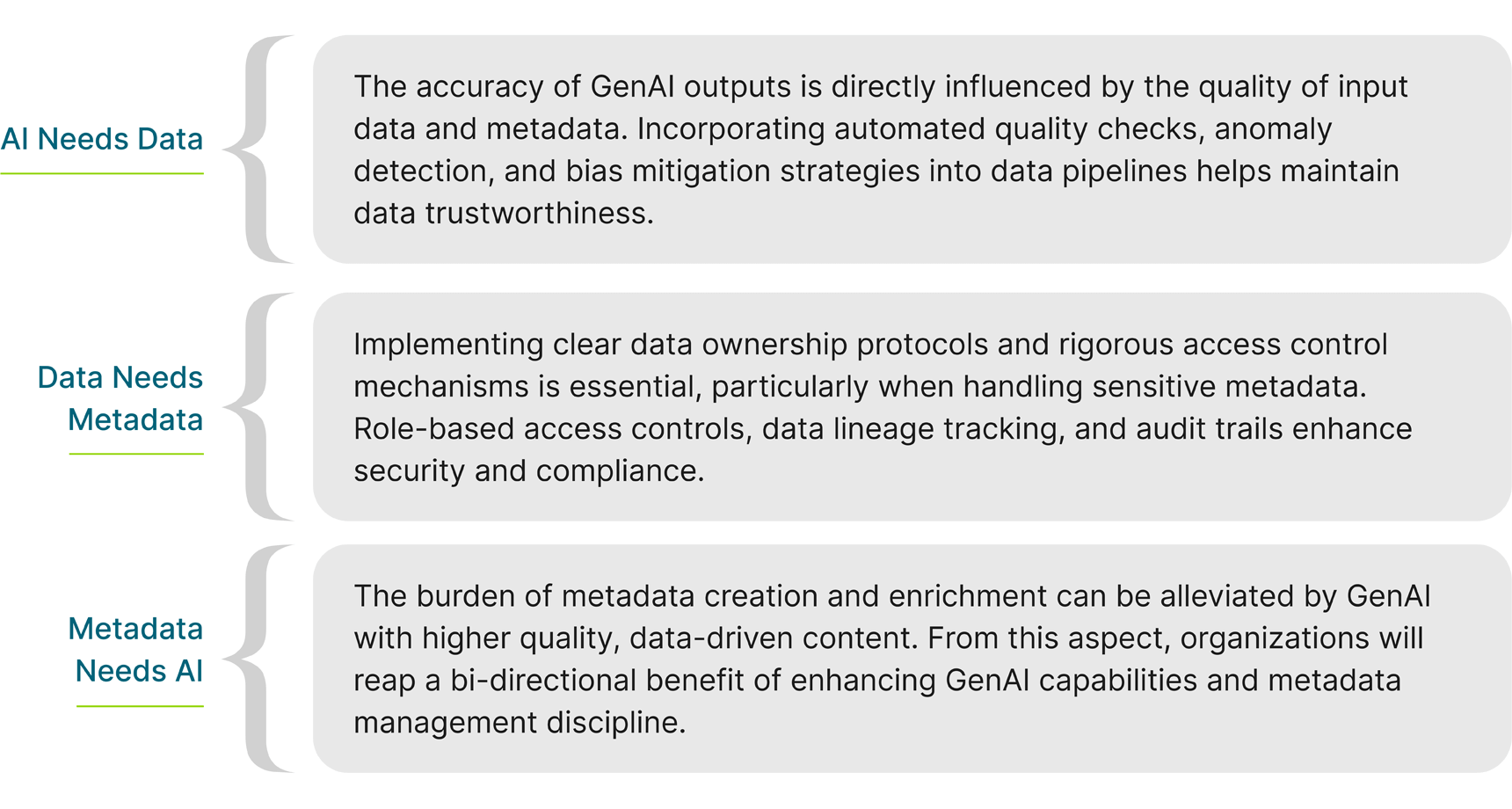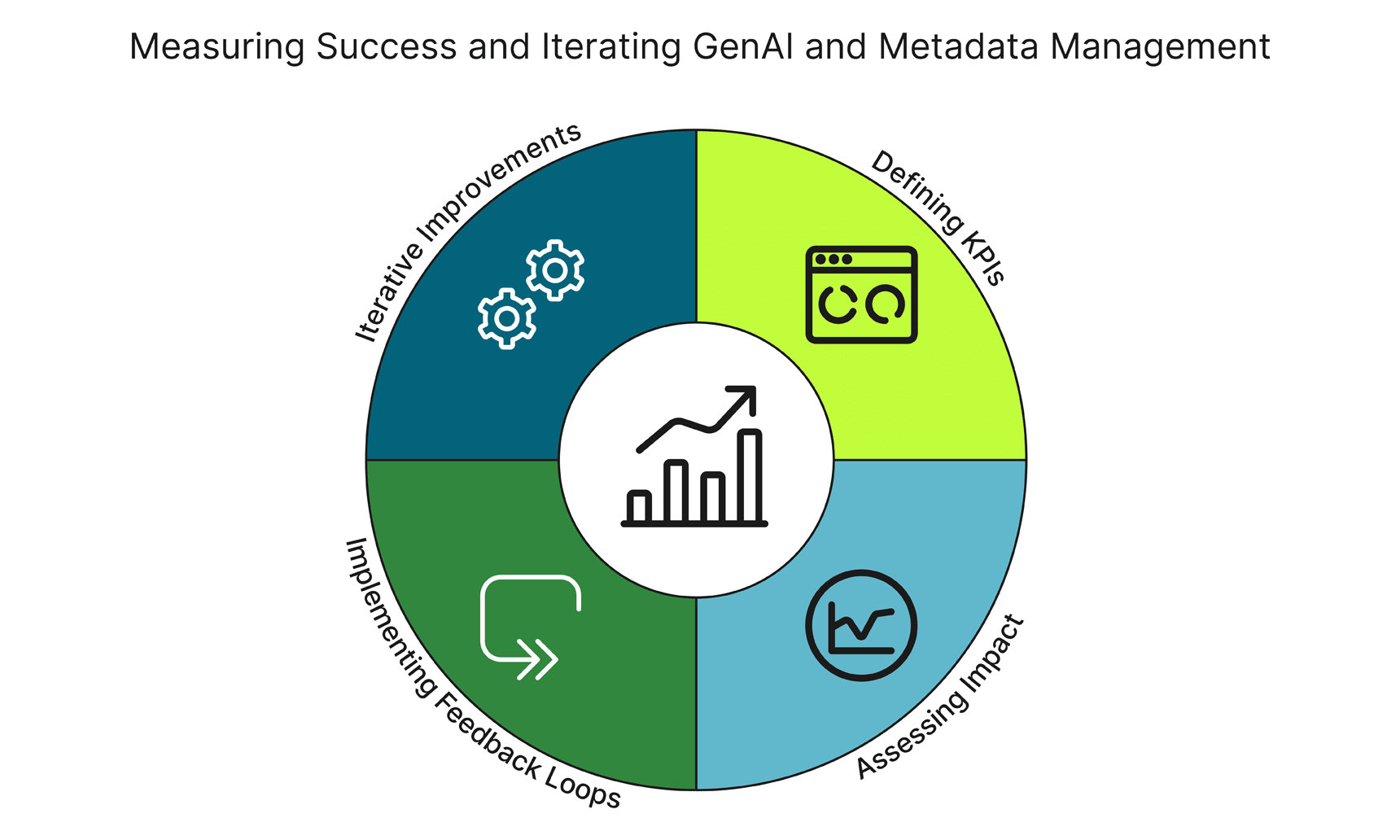 Search
Search


As organizations contend with exponentially growing data volumes, people and their technologies depend on metadata to manage and communicate around the data ecosystem. While both technical and business audiences benefit from having rich metadata providing context for data, creating and curating metadata has been a persistent challenge. Generative artificial intelligence (GenAI) has promising potential in metadata management and automation that enables organizations to catch up on metadata debt while preserving human oversight. In addition, extensive benefits and diverse applications arise from this powerful combination, offering insights into how organizations can leverage this technology to enhance their data management practices.
Metadata, often described as “data about data,” serves as the foundation for effective data management and utilization. Its importance cannot be overstated, as it plays a crucial role for the whole universe of data stakeholders in both operational and strategic functions. Well-structured metadata enables automation by providing the keys to anchor processes, integration points, and algorithms, and formalizes the context data managers and consumers rely on for identification, communication and coordination, and appropriate application. With sufficient metadata, organizations can achieve efficiencies with both distributed and centralized governance functions. Without adequate metadata, an organization’s data requires institutional knowledge to navigate, drudgery to describe, and nuanced facilitation for proper handling.
Many disciplines exist under the umbrella of data management, with endless possibilities to weave accelerators together. Here, we connect a core function with a target capability for mutually beneficial enablement.
Metadata—information about data—ranges in format and relevant audience. Generally, we recognize three primary categories displayed in the graphic below: technical, operational, and business metadata. GenAI has the potential to enhance data management practices and insights across all types of metadata.

Harnessing GenAI for metadata management
The application of GenAI to metadata management opens many possibilities for organizations looking to enhance their data management. GenAI excels in metadata creation and enrichment, automatically generating labels and annotations for diverse data assets.
This capability extends beyond generating descriptions for database objects like tables and columns or identifying common business terms; GenAI enables sophisticated metadata enrichment, such as business context derived from observing data usage patterns, data lineage transformations and end points, and users’ query trends.
To harness the full potential of GenAI for metadata management, organizations need a comprehensive framework that integrates AI capabilities with human oversight and existing systems.
Continuous monitoring and improvement
Disciplined metadata management is a core function of responsible data management, AI governance, and AI development. Performing this function requires help from technology along with a commitment to continuous monitoring and improvement.
Organizations must validate on an ongoing basis that metadata remains accurate, relevant, and meeting business needs over time. Key aspects of the continuous monitoring and improvement process, across the relationship between AI, data, and metadata, include the following principles:

Measuring success and iterating
As with any strategic investment, value recognition depends on measurement, monitoring, and continuous improvement. Organizations must establish clear metrics for success and use an iterative approach when implementing integrated GenAI and metadata management solutions. This involves:

Challenges and considerations
Leveraging GenAI for advanced metadata management involves navigating several challenges:
The integration of GenAI into metadata management represents a paradigm shift in how organizations handle and leverage their data assets. By automating and enhancing metadata creation, analysis, and management, GenAI opens new possibilities for data-driven decision making, improved efficiency, and innovation. The journey of implementing GenAI in metadata management requires thoughtful planning and continuous refinement. The key lies in embracing a flexible, ethical, and forward-thinking approach to metadata management, one that leverages the power of GenAI while remaining grounded in sound data governance principles.
Ethical considerations
As organizations increasingly rely on GenAI for metadata management, ethical considerations become paramount. Metadata should include information about the ethical considerations and limitations associated with data, so that AI models are trained and used responsibly. Metadata ethics can help prevent misuse of data and improve compliance with privacy regulations and industry standards.
Organizations should implement ethical guidelines for metadata creation and use, addressing issues such as data privacy, bias mitigation, and transparency. By embedding ethical considerations directly into the metadata management process, companies can build trust with stakeholders and promote the responsible use of AI technologies.
Guidehouse is a global advisory, technology, and managed services firm delivering value to commercial businesses and federal, state, and local governments. Serving industries focused on communities, energy, infrastructure, healthcare, financial services, defense, and national security, Guidehouse positions clients for AI-led innovation, efficiency, and resilience.